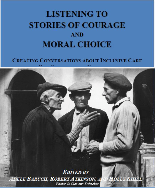
Narrative Works-Issues Investigations & Interventions
Scope & Guideline
Engaging Minds Through the Lens of Narrative Exploration
Introduction
Aims and Scopes
- Narrative Theory and Critique:
The journal emphasizes narrative theory, exploring its applications in literature, culture, and society. This includes critiques of narratives within modern contexts such as post-truth environments. - Personal and Social Transformation:
A core area of interest is how narratives contribute to personal identity and social change, particularly through the lens of personal stories and collective narratives. - Interdisciplinary Approaches:
The journal encourages interdisciplinary research that integrates narrative studies with fields such as health care, education, and cultural studies, emphasizing diverse methodologies. - Ethics and Civic Engagement:
Exploring the ethical dimensions of storytelling and the role of narratives in civic engagement and social justice initiatives is a significant focus, highlighting the power of narrative in shaping public discourse. - Decolonization and Epistemic Authority:
The journal also addresses the need for decolonizing narrative practices, advocating for the amplification of diverse voices and perspectives in narrative research.
Trending and Emerging
- Narrative in Health and Social Care:
There is a growing trend towards exploring the role of narrative in health and social care, particularly in how personal stories can enhance identity and foster engagement in these fields. - Civic Storytelling and Engagement:
The focus on civic storytelling has increased, emphasizing how narratives can empower communities and influence public discourse, particularly in contexts of social justice and activism. - Digital Narratives and New Media:
The rise of digital narratives, including memes and online storytelling, is a prominent theme, reflecting shifts in how narratives are created and consumed in contemporary society. - Decolonization of Narratives:
An emerging focus on decolonizing narrative practices highlights the importance of diverse voices and perspectives, challenging dominant narratives and advocating for epistemic justice. - Narrative Vulnerability and Healing:
The exploration of vulnerability in storytelling, particularly among marginalized voices, is gaining attention, as it is seen as a means of fostering empathy and understanding in both personal and communal contexts.
Declining or Waning
- Traditional Literary Analysis:
There appears to be a declining interest in conventional literary analysis that does not engage with contemporary issues or interdisciplinary connections, as newer papers focus more on narrative's social implications. - Static Interpretations of Narrative:
Themes that treat narratives as fixed texts without considering their dynamic interactions with audiences and contexts are becoming less prevalent, giving way to more fluid interpretations that consider narrative's evolving nature. - Nostalgic Perspectives on Storytelling:
Older, nostalgic views of storytelling that emphasize traditional formats are waning, as the journal increasingly embraces innovative and contemporary storytelling methods, such as digital narratives and meme culture.
Similar Journals
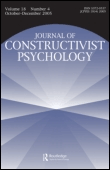
JOURNAL OF CONSTRUCTIVIST PSYCHOLOGY
Bridging Theory and Practice in Constructivist PsychologyJOURNAL OF CONSTRUCTIVIST PSYCHOLOGY, published by Taylor & Francis Inc, is a leading international journal dedicated to the exploration of constructivist approaches in psychology. With an ISSN of 1072-0537 and an E-ISSN of 1521-0650, this journal serves as a critical platform for researchers, professionals, and students interested in the dynamic intersections of developmental, educational, and social psychology, with a particular focus on linguistic and language frameworks. Over its esteemed publication span from 1994 to 2024, the journal has established itself as influential in the academic community, proudly holding a Q1 ranking in Linguistics and Language, and achieving commendable Q3 rankings in Developmental and Educational Psychology and Social Psychology. The journal's rigorous peer-review standards ensure that each article contributes significant insights to its fields, making it a vital resource for advancing theoretical and practical applications in constructivist methodology. With a solid reputation reflected in its Scopus rankings and percentile standings, JOURNAL OF CONSTRUCTIVIST PSYCHOLOGY continues to shape contemporary discourse and innovation in psychology.
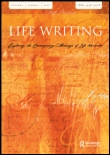
Life Writing
Advancing the Dialogue on Identity and ExperienceLife Writing, published by Routledge Journals, Taylor & Francis Ltd, is a prestigious academic journal dedicated to the field of Literature and Literary Theory. With an impressive impact factor and listed in the top quartile (Q1) of its category, it ranks #91 out of 1106 in the Scopus database, placing it in the 91st percentile – a testament to its significant influence and reach within the academic community. Since its inception in 2004, Life Writing has provided a vital platform for scholars and practitioners to explore the nuances of life writing across various genres and cultures. The journal emphasizes critical and theoretical approaches while promoting innovative research, making it an essential resource for researchers, professionals, and students alike. With a commitment to advancing the discourse on autobiographical narratives, memoirs, and biographies, Life Writing fosters a rich, interdisciplinary dialogue that is crucial for understanding personal and collective identities in contemporary literature.

Cahiers de Narratologie
Engaging Minds in the Study of StorytellingCahiers de Narratologie is a distinguished academic journal dedicated to the study of narratology, published by the Laboratoire Interdisciplinaire Récits, Cultures, & Sociétés (LIRCES). Since its inception in 2001, this Open Access journal has provided a vital platform for researchers, scholars, and students to explore and disseminate knowledge on narrative theory and its multifaceted applications across various disciplines. With a commitment to fostering interdisciplinary dialogue, Cahiers de Narratologie features rigorously peer-reviewed articles, critical essays, and innovative research that delve into the complexities of narrative structures, practices, and effects in contemporary culture. As an essential resource for understanding the intersection of storytelling and cognition, this journal plays a significant role in shaping the field and supporting scholarly discourse on narratives. The journal is based at UNIV NICE-SOPHIA ANTIPOLIS, in the picturesque region of NICE, FRANCE, and continues to attract contributions from a global network of narrative researchers.

Acta Literaria
Connecting Innovators in the World of LiteratureActa Literaria is a distinguished journal published by the Universidad de Concepción, Facultad de Humanidades y Arte, focusing on the intricate domains of literature and literary theory. With an ISSN of 0717-6848, this Chilean journal has been a vital contributor to the scholarly discourse in its field since its inception in 2007. Although currently categorized in the Q4 quartile for the year 2023 and holding a Scopus rank of #860 out of 1106 in the Arts and Humanities section, Acta Literaria plays a crucial role in fostering dialogue and exploration among researchers, professionals, and students alike. The journal aims to facilitate the exchange of innovative ideas, critical analyses, and diverse perspectives on literature, making it an indispensable resource for anyone engaged in literary studies. While it does not offer open access, the journal's commitment to upholding academic rigor ensures that it remains a respected platform for scholarly publication.
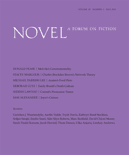
NOVEL-A FORUM ON FICTION
Advancing Critical Thought in Narrative StudiesNOVEL-A FORUM ON FICTION, published by DUKE UNIVERSITY PRESS, is an influential peer-reviewed journal dedicated to the critical exploration and analysis of contemporary fiction. With an ISSN of 0029-5132 and an E-ISSN of 1945-8509, this journal serves as a vital platform for scholars and practitioners in the fields of literature and literary theory. Its commendable impact factor and a ranking of #265/1106 in Scopus place it firmly within the 75th percentile of its category, highlighting the quality and relevance of its published work. Operating within the United States, NOVEL spans contributions from 2002 to 2024, providing comprehensive coverage in its Q3 quartile ranking for 2023. Though it does not offer Open Access, the journal’s dedication to fostering scholarly dialogue and advancing critical thought in narrative studies makes it an essential resource for researchers, practitioners, and students seeking to deepen their understanding of fiction and its myriad implications.
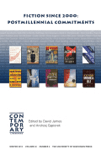
CONTEMPORARY LITERATURE
Advancing Scholarship in the Literary LandscapeCONTEMPORARY LITERATURE, published by the prestigious University of Wisconsin Press, stands as a vital platform for scholars and enthusiasts within the field of literary studies. With its ISSN 0010-7484 and E-ISSN 1548-9949, this journal has established itself as a respected source of innovative research across various dimensions of literature and literary theory. Holding an impressive Q2 ranking in the 2023 category of Arts and Humanities, this publication not only reflects current trends but also fosters critical discourse around contemporary authors and movements from 2002 to 2024. Engaging articles submitted to CONTEMPORARY LITERATURE enhance our understanding of narrative forms and their cultural relevance, making it an essential read for academics, professionals, and students alike. While the journal is not open access, its impact within the literary community continues to grow, as evidenced by its Scopus rank of #616 out of 1106. For those dedicated to exploring the evolving landscape of literature, CONTEMPORARY LITERATURE is a must-have in one's scholarly toolkit.
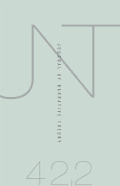
JNT-JOURNAL OF NARRATIVE THEORY
Exploring the Depths of Narrative StructuresJNT - Journal of Narrative Theory is a pivotal academic journal dedicated to the exploration and analysis of narrative structures across various literary and cultural contexts. Published by Eastern Michigan University, this journal serves as a critical platform for scholars, researchers, and practitioners in the fields of Literature and Literary Theory as well as Cultural Studies. With its ISSN of 1549-0815 and E-ISSN of 1548-9248, JNT has established a reputation for advancing the discourse on narrative forms through a variety of analytical lenses while maintaining its commitment to rigorous scholarship. As of 2023, JNT holds commendable rankings in tier categories Q2 and Q3 according to Scopus, demonstrating its impact and relevance within the fields it covers—being positioned in the 68th and 40th percentiles respectively. Aimed at fostering academic dialogue, JNT invites contributions that not only interpret and critique existing narratives but also introduce innovative theoretical frameworks that challenge conventional understandings. This journal is an essential resource for those invested in the narrative arts, fostering critical engagement and promoting interdisciplinary perspectives.

Departures in Critical Qualitative Research
Exploring the Depths of Qualitative InquiryDepartures in Critical Qualitative Research, published by University of California Press, is an influential journal dedicated to advancing knowledge within the realms of Communication and Linguistics and Language. With its commitment to exploring the complexities and nuances of qualitative research, this journal has quickly established itself as a vital resource for scholars and professionals alike. Although it currently resides in the fourth quartile in Communication and the third quartile in Linguistics, its notable Scopus rankings, including a 64th percentile in Language and Linguistics, highlight its growing significance in the academic discourse. Covering a converged period from 2019 until 2024, the journal seeks to foster innovative and critical perspectives on qualitative methodologies, offering invaluable insights that address contemporary social issues. Access to its content is available to a wide audience, contributing to the journal's reputation as a beacon for those engaged in critical qualitative research.
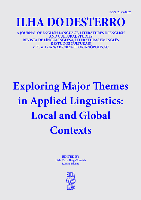
Ilha do Desterro-A Journal of English Language Literatures in English and Cultural Studies
Exploring the Intersections of Literature and CultureIlha do Desterro: A Journal of English Language Literatures in English and Cultural Studies, published by the Universidade Federal de Santa Catarina, is a prestigious open-access journal that has been contributing to the fields of literature and cultural studies since 1979. With an ISSN of 0101-4846 and E-ISSN 2175-8026, it has solidified its role as a significant platform for scholars seeking to explore the intricate relationship between English literatures and cultural phenomena. Recognized in the Q2 quartile for Literature and Literary Theory and ranked 370 out of 1106 in the Scopus index (66th percentile), Ilha do Desterro fosters an inclusive environment for research and dialogue, encouraging contributions that examine diverse literary landscapes through various critical lenses. With its commitment to open access, the journal ensures that the findings and discussions within are readily available to researchers, professionals, and students worldwide, enriching the academic discourse in English studies and beyond.

Narrative Culture
Unveiling the Power of Narrative in Human CultureNarrative Culture is a distinguished academic journal that explores the multifaceted world of storytelling across various disciplines including Anthropology, Linguistics, and Literary Theory. Published by Wayne State University Press, this journal serves as a platform for rigorous scholarship and innovative research that emphasizes the centrality of narrative in human culture and society. Since its inception in 2014, Narrative Culture has steadily established itself within the academic community, earning a Q3 quartile ranking in both Anthropology and Linguistics, and a Q2 ranking in Literature and Literary Theory as of 2023. Despite its non-open access model, the journal remains committed to disseminating vital research that not only enhances understanding of narrative forms but also fosters interdisciplinary dialogue. With impressive Scopus rankings reflecting its scholarly impact—positioned in the 77th percentile for Literature and Literary Theory—this journal is an essential read for researchers, practitioners, and students who seek to engage with contemporary discussions surrounding narrative practices.